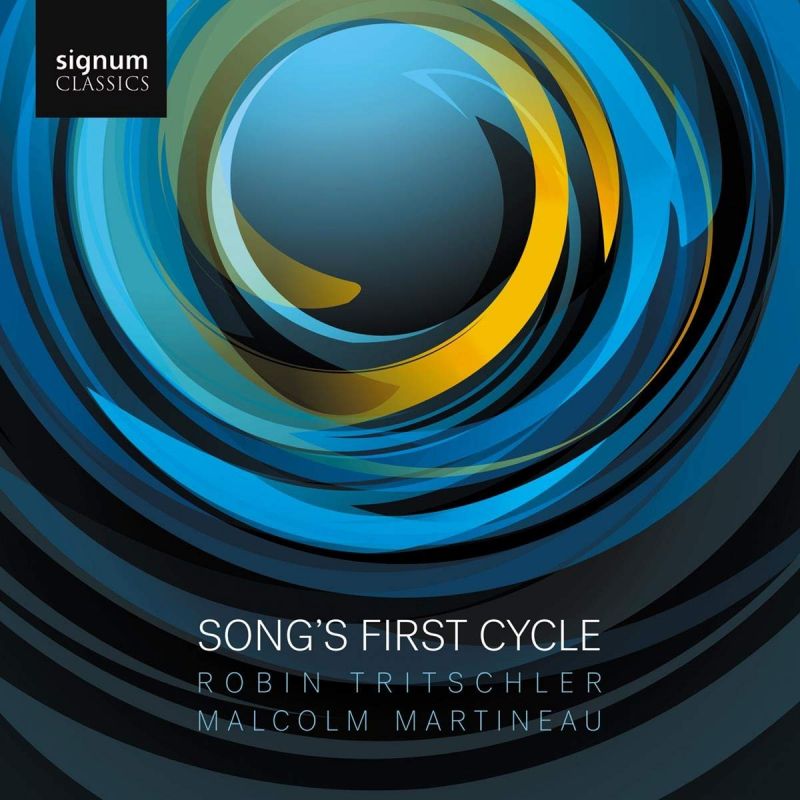Song's First Cycle: Mozart, Schubert, Beethoven, Weber
View record and artist detailsRecord and Artist Details
Composer or Director: Franz Schubert, Wolfgang Amadeus Mozart, Carl Maria von Weber, Ludwig van Beethoven
Genre:
Vocal
Label: Signum Classics
Magazine Review Date: 01/2020
Media Format: CD or Download
Media Runtime: 83
Mastering:
DDD
Catalogue Number: SIGCD587

Tracks:
| Composition | Artist Credit |
|---|---|
| Verdankt sei es dem Glanz der Grossen |
Wolfgang Amadeus Mozart, Composer
Malcolm Martineau, Piano Robin Tritschler, Tenor Wolfgang Amadeus Mozart, Composer |
| Sei du mein Trost, 'An die Einsamkeit' |
Wolfgang Amadeus Mozart, Composer
Malcolm Martineau, Piano Robin Tritschler, Tenor Wolfgang Amadeus Mozart, Composer |
| Ich würd' auf meinem Pfad (An die Hoffnung) |
Wolfgang Amadeus Mozart, Composer
Malcolm Martineau, Piano Robin Tritschler, Tenor Wolfgang Amadeus Mozart, Composer |
| Labetrank der Liebe |
Franz Schubert, Composer
Franz Schubert, Composer Malcolm Martineau, Piano Robin Tritschler, Tenor |
| An die Geliebte |
Franz Schubert, Composer
Franz Schubert, Composer Malcolm Martineau, Piano Robin Tritschler, Tenor |
| Wiegenlied |
Franz Schubert, Composer
Franz Schubert, Composer Malcolm Martineau, Piano Robin Tritschler, Tenor |
| Mein Gruss an den Mai |
Franz Schubert, Composer
Franz Schubert, Composer Malcolm Martineau, Piano Robin Tritschler, Tenor |
| Skolie |
Franz Schubert, Composer
Franz Schubert, Composer Malcolm Martineau, Piano Robin Tritschler, Tenor |
| (Die) Sternenwelten |
Franz Schubert, Composer
Franz Schubert, Composer Malcolm Martineau, Piano Robin Tritschler, Tenor |
| (Die) Macht der Liebe |
Franz Schubert, Composer
Franz Schubert, Composer Malcolm Martineau, Piano Robin Tritschler, Tenor |
| An die ferne Geliebte |
Ludwig van Beethoven, Composer
Ludwig van Beethoven, Composer Malcolm Martineau, Piano Robin Tritschler, Tenor |
| Die Temperamente bei dem Verluste der Geliebten |
Carl Maria von Weber, Composer
Carl Maria von Weber, Composer Malcolm Martineau, Piano Robin Tritschler, Tenor |
| Einsamkeit |
Franz Schubert, Composer
Franz Schubert, Composer Malcolm Martineau, Piano Robin Tritschler, Tenor |
Author: Tim Ashley
Robin Tritschler and Malcolm Martineau explore the early history of the song-cycle in this thoughtful recital, which flanks Beethoven’s An die ferne Geliebte, the first acknowledged work in the genre, with sets of songs that can either be viewed as the cycle’s precursors or were written in imitation. Tritschler provides the scholarly booklet notes himself, cogently arguing that Mozart’s songs from Timotheus Hermes’s then popular novel Sophiens Reise form a striking portrait of a man whose capacity for self-deprecation results in tragic isolation from humanity. He also carefully examines whether Weber’s Die vier Temperamente should be regarded as a genuine cycle or a set of songs linked by the common theme of thwarted love, that can be performed in any order, or indeed individually.
The jury is seemingly out, meanwhile, on whether Schubert’s seven songs to poems from the ‘Selam’ almanac, written in a single day (October 15) in 1815, constitute ‘a mini song-cycle’, as designated by Walther Dürr, editor of the Neue Schubert-Ausgabe, though the set is underpinned by the idea, essentially derived from Plato, that human love affords access to the divine. There can be little doubt, though, that Schubert’s enormous 1818 Mayrhofer setting ‘Einsamkeit’, more a cantata for voice and piano than a song, takes An die ferne Geliebte as a point of departure, and that both its six linked sections and Schubert’s use of comparable piano figurations refer directly back to Beethoven’s cycle.
Tritschler sings his programme as eloquently as he writes about it. Pride of place inevitably goes to the Beethoven, where he combines something of Fritz Wunderlich’s warmth with Christian Gerhaher’s altogether darker introspection (Sony, 10/12), and is beautifully alert to the cycle’s constant shifts of emotion and mood, a quality that similarly informs his intense performance of ‘Einsamkeit’. The Weber set, characterised by an almost operatic immediacy, is by turns flippant, sorrowful, ironic and desperately sad. Tritschler’s ease and beauty of tone are very much apparent in his Mozart, while his telling yet understated way with words comes to the fore in the ‘Selam’ songs, where the extended strophic forms are apt to seem repetitive if not as carefully handled as they are here.
He and Martineau, meanwhile, very much form an equal partnership, and you get a real sense of almost instinctive give and take between them, above all in An die ferne Geliebte, where the accompanying piano variations carry so much of the emotional weight and resonance. The recording itself is clear and spacious, though the accompanying texts and translations leave much to be desired, with whole stanzas omitted and frequent differences between what is printed and what is sung. Otherwise, this is a most distinguished recital, and highly recommended.
Explore the world’s largest classical music catalogue on Apple Music Classical.
Included with an Apple Music subscription. Download now.

Gramophone Digital Club
- Digital Edition
- Digital Archive
- Reviews Database
- Events & Offers
From £9.20 / month
Subscribe
Gramophone Club
- Print Edition
- Digital Edition
- Digital Archive
- Reviews Database
- Events & Offers
From £11.45 / month
Subscribe
If you are a library, university or other organisation that would be interested in an institutional subscription to Gramophone please click here for further information.






